“The more your trench looks like a grave, the better your chances of survival.” Things that save, annoy, surprise, and delight soldiers fighting on the front
It all started with fire. No, not with fire from phosphorus bombs. With that fire which is of divine origin and not hellish.
Then there was the earth. No, it had not yet shuddered from the explosions of mines.
Advertisement:Air appeared after it. No, this is not a run-for-shelter command.
And the last element was water. No, it hasn't filled the trenches yet. The ancient Greeks believed the world was formed from these four elements.
From fire, earth, air and water. The four elements that became the foundation of everything. But this article is not about natural philosophy.
It is about the everyday life of a soldier at the front. About how these four elements acquired a different power with the war. And how sometimes they help the soldier to survive and sometimes - vice versa.
"We survive where there is no life. And this taught us not to die where there is so much death," says military officer Anton Filatov.
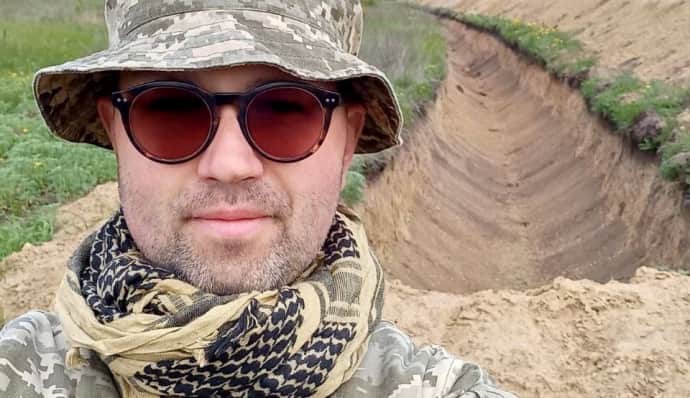 Anton Filatov: Last summer, I dug a trench for the first time, and the Russians covered this square with fire. And I listened to music and did not pay much attention.
Anton Filatov: Last summer, I dug a trench for the first time, and the Russians covered this square with fire. And I listened to music and did not pay much attention.
And only when you see cargo-200, cargo-300, fear and cold sweat begin.PHOTO: ANTON FILATOV
If we had talked to him two years ago, he could have become our guide to the world of cinema. A member of the International Federation of the Film Press and the Ukrainian Film Academy - who could do better? But since then, instead of travelling to the festivals in Cannes, Berlin and Venice, he fought near Lysychansk and got to know the landscapes of Soledar, Bakhmut, and Sloviansk.
That is why we are now asking Filatov to become our guide in the world of war - to tell about the life, everyday life and faith of a soldier through the prism of his attitude to the fundamentals of existence. Some philosophers added a fifth to the four elements - aether. But cinematography taught us that the fifth element is human/man.
One who tries to survive in places where there is no life. So Anton Filatov, a former film critic and currently a soldier of the Ukrainian army, talks about five elements that are intertwined today with one more element - the element of war.
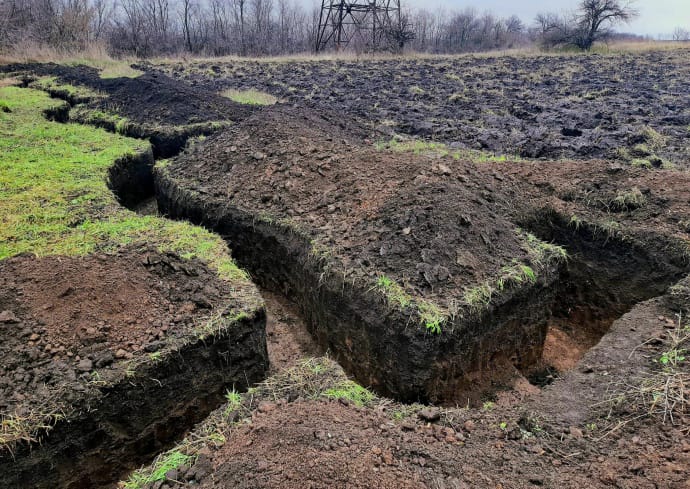 Anton Filatov: We are standing near the trench. Something rumbles nearby. The guards report that large-sized equipment is moving across the field.
Anton Filatov: We are standing near the trench. Something rumbles nearby. The guards report that large-sized equipment is moving across the field.
A man comes out of it and walks directly towards us. A man approaches and gestures that he wants to tell us something... A few hours later, this man finished ploughing the field close to the trench. "We have to live on.
I will sow sunflowers in the spring," he said during a smoke break. This is faith in tomorrow.Photo - Anton Filatov
Earth
Protects - guides - determines the way of thinking The earth on the front determines your level.
Literally, without metaphor. You are on the ground or underground. You have a chance to survive, or there is no such chance.
The more your trench looks like a grave, the more chances you have to stay alive. Burrowed in a hole, and that's it. The earth here is your home, again without metaphors.
These are walls, shelter, your armour, and protection. When you walk in a trench wet, the earth sticks to you. There may be several kilograms of mud on the breeches and clothes.
But you don't feel dirty. This is very strange to me. At home, I washed my hands 20 times a day, and here, 20 times a month.
And, actually, this dirt is no longer perceived as dirt. It's just a part of you and your existence. ***
The frozen ground is screwed. Last winter, we had a division of diggers, about ten people. They went to the position in the evening in armoured cars with shovels and machine guns, drove for a long time and dug a dugout at night.
The road to the point where you have to dig took about three hours. Their task was to dig in with two shovel bayonets.
10 men dig a rectangle 4 by 3 metres two bayonets deep. It's just, you know, some kind of stonemasons.
They don't dig the ground; they break it, break it, break it, move down little by little. *** On 21 June 2022, when I drove with the battalion to Donetsk Oblast, the first thing that struck me was nature.
I saw how dry the earth was and how thorny plants were. No matter where you go, you constantly cling to some grass, flower, or shrub. Then, it occurred to me for the first time that the land determines the way of thinking of the people who live on it.
Local people are rather prickly people, direct and sharp. I'm used to living in a community where you think ten times before you say something. And here everything is very simple, easy.
It's not a problem to say something offensive. *** Stressful situations often occur here.
And the earth is also a lightning rod for you. Any lightning, no matter how powerful it is, loses power when it hits the ground. And when you live in the ground, in a trench, in a dugout or in a basement, cellar, you ground yourself.
During the war, the earth absorbs all emotions and bright experiences. They pass through you very quickly and go into the ground.
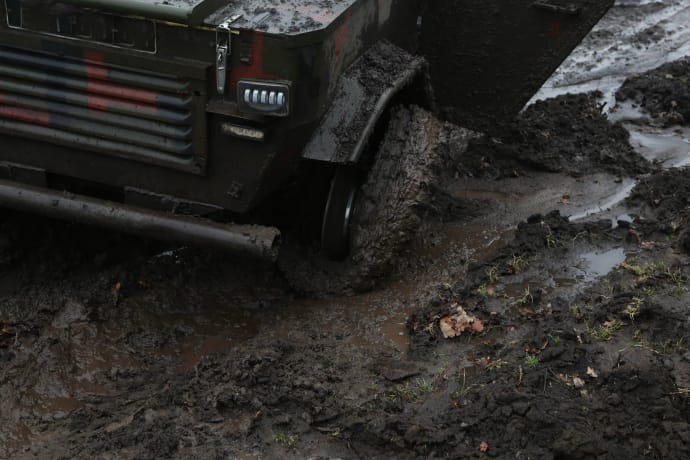 Anton Filatov: The earth here is like a conductor. If fate does not allow you to reach it, you will not reach it, no matter how much you want to.
Anton Filatov: The earth here is like a conductor. If fate does not allow you to reach it, you will not reach it, no matter how much you want to.
Even if you drive with modern equipment, you won't make it. And if it is what fate wants you to do, you will pass even through impassable places.Photo - Yan Dobronosov/Global Images Ukraine via Getty Images
The earth guides here. Not the roads but the land.
Because your path goes through a landing or through a field, where people don't usually go. And the earth either gives you a way or abruptly stops you. You just get bogged down in mud or swamp.
Or, on the contrary, a couple of pebbles suddenly open, over which you can jump and walk. I don't know how it happens. This is a mystery.
Water
Slows down the war - makes dirty and cleans - makes it real
Too much coffee has been in my life/I've started to drink too much coffee since I got to the front. And the more I drink coffee, the more I understand: the most delicious drink in life is plain water. In my first week at the front last summer, we dug trenches near the oil refinery in Lysychansk with picks in hand.
Heat, stony ground. On the fourth or fifth day, we ran out of water. Finally, they brought it - not in bottles, but from the nearest tap, which was still working.
Dirty, of yellowish colour. It was very tasty water. Another time, we were near Bakhmut in Stupochky, and we lived at a factory.
There was neither a well nor a water supply nearby. We drained technical water from the cooling system, showered, and washed clothes.
Advertisement:The guys who went to the contact line in winter said that there were also problems with water there. The car does not approach the contact line.
They disembark a few kilometres away and then walk. You can't carry much water through the mud. They calculated that each person had 100 grams of water for half a day.
This is almost nothing, even though they were constantly digging. Those who are in combat positions for a long time in winter melt the snow and salt this water to somehow enrich it with trace elements. But the mobilised body can somehow withstand dirty hands, dust around, dirty water, and bad air.
It's surprising, but I don't get sick here much compared to a peaceful life - much less. I don't remember what a cold is.
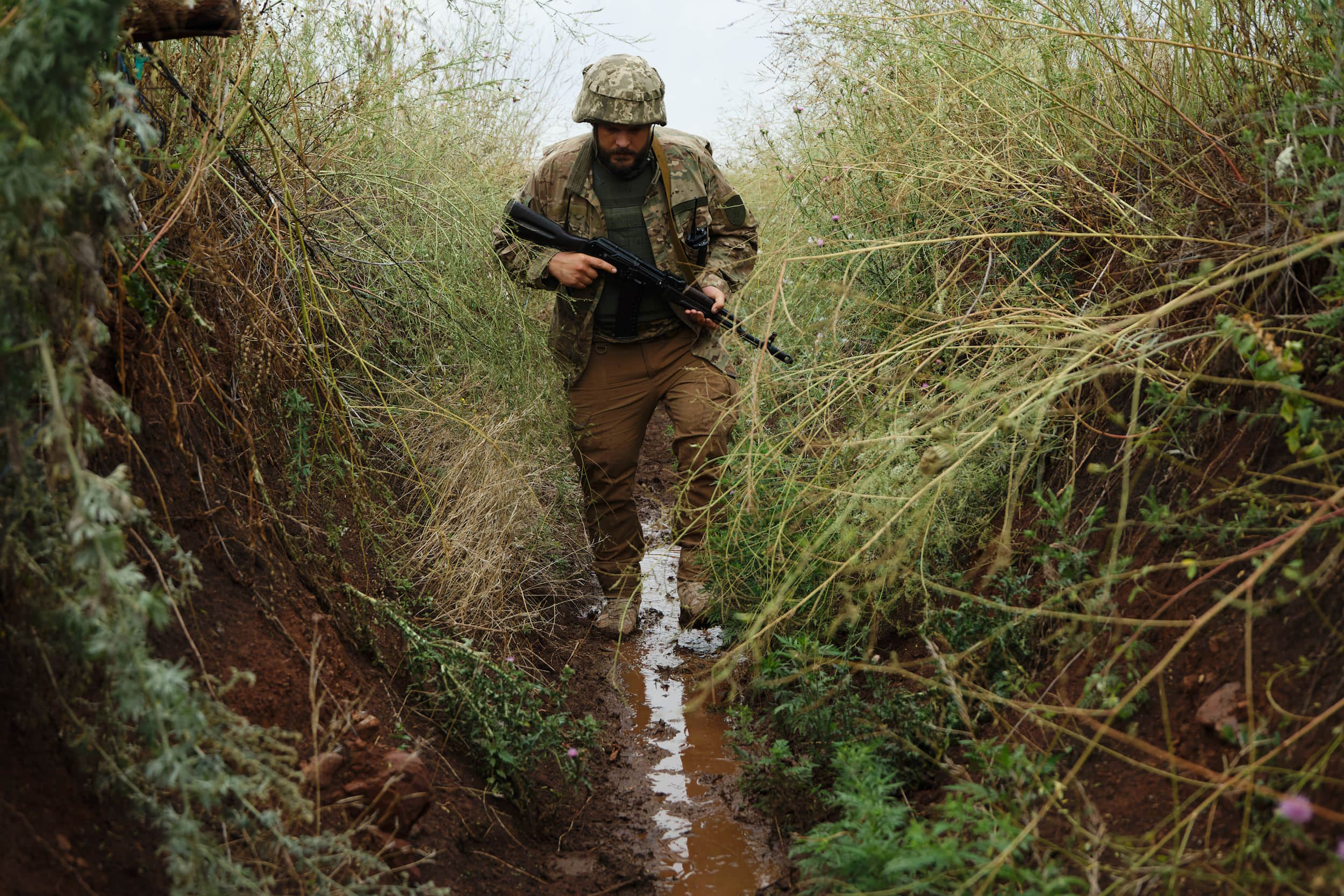 Anton Filatov: Water both pollutes and cleans, pleases and creates a lot of problemsPHOTO: DMYTRO LARIN
Anton Filatov: Water both pollutes and cleans, pleases and creates a lot of problemsPHOTO: DMYTRO LARIN
In Donbas, the climate is such that there is very little rain in the summer. And every rain raises the mood.
On the other hand, water from the sky for a soldier is always about wet feet. And when the cold rains begin - about colds, kidney diseases and hypothermic joints. Starting from the second half of October, the water slows down the course of hostilities.
Going on the offensive during the rains is so difficult that it loses all meaning. And drones, of course, don't fly. The sky is closed.
Water cleanses the earth from war. *** In March 2022, before I joined the military, we made fun of the brutish Russians who were looting washing machines.
Once a washing machine was found inside a helicopter that was shot down. I later realised that on the front a washing machine could buy you the most precious thing: time. It spares you from spending an entire hour washing things in a bucket with your own hands.
By the way, laundry issues are easy to solve: cargo vans can be converted into mobile laundries by retrofitting them with one or two water tanks, two cubic metres each, a power generator, two or three washing machines, a dryer, and a shelf to store detergents and other such things. In a week, a mobile laundry like this can fulfil an entire battalion's laundry needs. It's a really great solution that makes everyone's lives easier.
Advertisement:***
On the front, the shower is the only place where you can spend time on your own. It's a very intimate space, a space where you shut off from the rest of the world and open up to yourself. It reminds me of those meditation rooms in Japanese offices.
But on a more physiological level, because guys use the shower to shave, to wash themselves clean, to cry, to jerk off, to cut their hair. It's a very rare opportunity. Now we have summer showers, and they're great.
Normally though we'd take a shower once a week or so. You're always wearing the uniform, often even sleeping in it, and the shower is the only place where you can take it off. Even your sleep doesn't belong to you, but the shower does.
It's the place where you can be yourself.
Air
Smells like freedom - makes you take cover - helps you shift gears To me, the air on the front smells like freedom. Yes, you have orders, rules, regulations, uniforms pressing in on you from all sides, but inside you're completely free.
You can do things you could never imagine doing. Totally free-style. Here you're very honest with yourself and with others.
Let me give you an example. We get a parcel with food. We open it and put it in the middle of the room.
Anyone can help themselves to anything inside of it. One soldier was egging another one on to try a hot pepper - he told him to go fuck himself. It wasn't offensive at all - they were just both totally open and frank with each other.
In peacetime or under other circumstances you'd try to explain why you don't eat spicy food - or you'd just eat the pepper. To not offend anyone. Here, it's different.
First, you're always surrounded by lots of people - you can't please everyone. Second, you might be killed any day. And what were you doing on the last day of your life?
Trying to please someone or fit in? Come on.
Advertisement:*** When you hear "Air!" it usually means something's coming at you from the sky, a missile or a drone.
Until recently the guys would fall to the ground and pretend they're dead whenever they'd hear "Air!" But it doesn't work that way. You can't lie on the ground in the same position for seven hours. Even if you do, you just won't be able to get up for hernia between your vertebrae.
So when we hear drones in the air, we take cover - if the cover's robust enough. But sometimes enemy drones' engines shut off on approach, so that we can't hear it. It travels the last 100 metres to its target in absolute silence.
You can see but not hear it. It's a terrible tactic. Very effective and terrible.
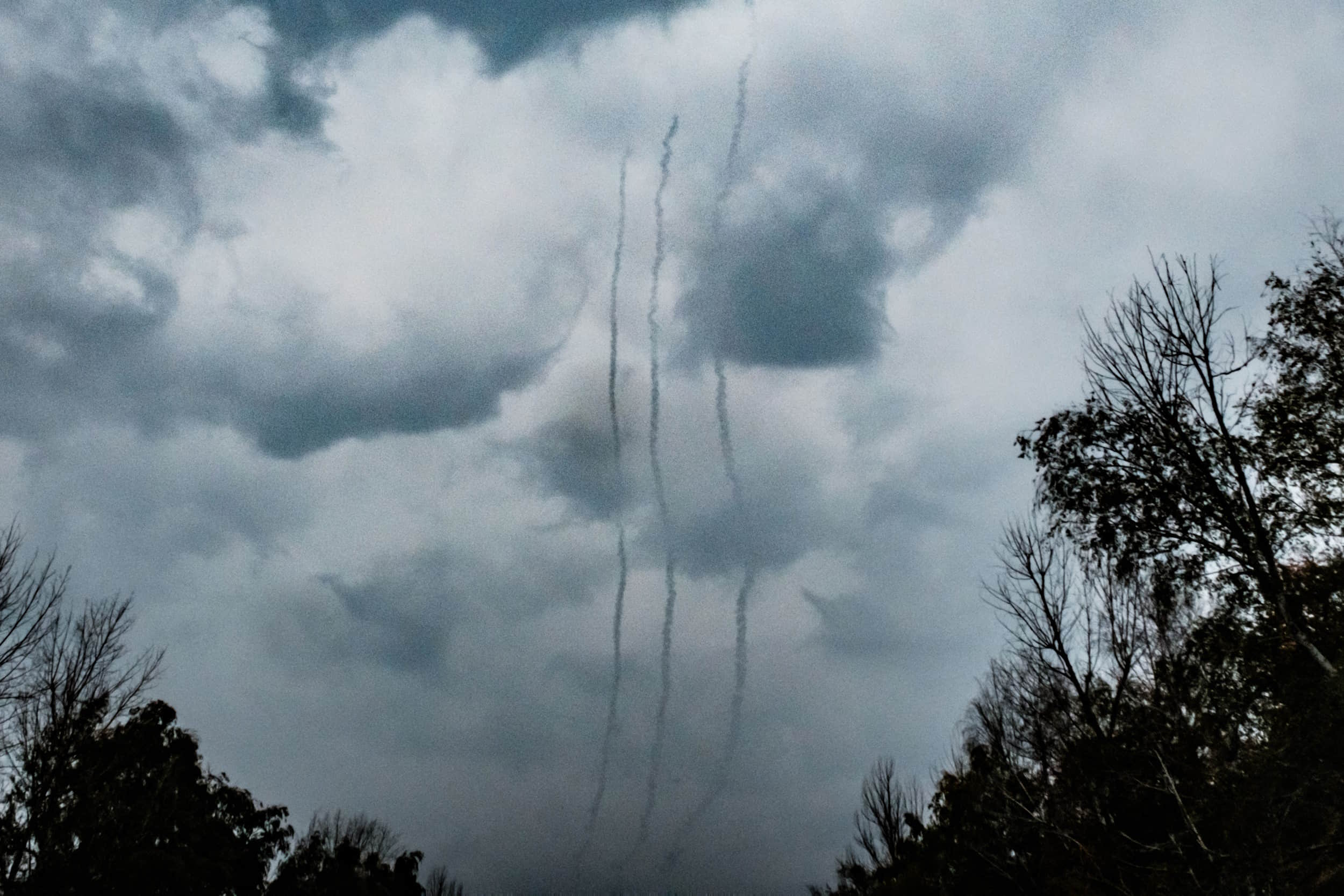 Anton Filatov: I feel no fear when I look into the sky, quite the oppositePhoto - YASUYOSHI CHIBA/AFP via Getty Images
Anton Filatov: I feel no fear when I look into the sky, quite the oppositePhoto - YASUYOSHI CHIBA/AFP via Getty Images
When you're in a trench, you see its walls, your weapons, the three or four things you've brought with you, and a bit of food - that's it.
Sometimes your section of the front doesn't get attacked for months on end. You just sit there and watch - nothing. The sky's the only thing you see that changes: clouds go past, the sun shifts.
An abstraction without an end; it helps you switch off. I remember talking to a chaplain who had just visited a group of soldiers who'd gone through very difficult battles. I asked him how he helps them cope with what they'd been through.
He was from the Ukrainian Orthodox Church, but his answer was in a Buddhist spirit. He said they should become attuned to what was going on around them; nature is a living organism with infinite energy, which you just have to learn to let in. I was struck by his reply.
It was a stark contrast with the daily grind of our lives: we were hungry, angry, sleep-deprived men with a ton of guns. Against this ferocious reality, the chaplain's reply seemed subtle and thoughtful.
Fire
Warms you up and dries you off - comforts you - destroys On the front, fire is a luxury.
It warms you up and dries you off - and it feeds you. Being able to cook and have some hot food on the front is a luxury. Being able to boil water is a luxury.
We used to make coffee in the trenches. We'd share a mug of some shitty MacCoffee which tastes like yellow water and torched iron. But it was a good coffee.
The only coffee we'd had in a long time. *** Early on the guys all got camping stoves, the really small ones.
But they only last enough for about three mugs of water - and that's it. You drag this thing around you, the burner, and can't get more than two meals out of it. So we've switched to five-litre gas bottles, which we refill at gas stations.
In winter, trying to heat up the place where you're living is a real issue. Everything seizes up in the cold. Your whole being shrinks down to the bare essentials.
In winter, everyone becomes really rational. There's no milling about. Not enough energy, not enough sun, not enough warmth - not enough anything.
Cold makes everything that doesn't matter fall away. You only have enough energy for the most crucial things. Fire then isn't just something you use to cook and warm up, but something that helps your mental state.
But I'm talking about the fire you can control, while most fire here is the fire you exert absolutely no control over.
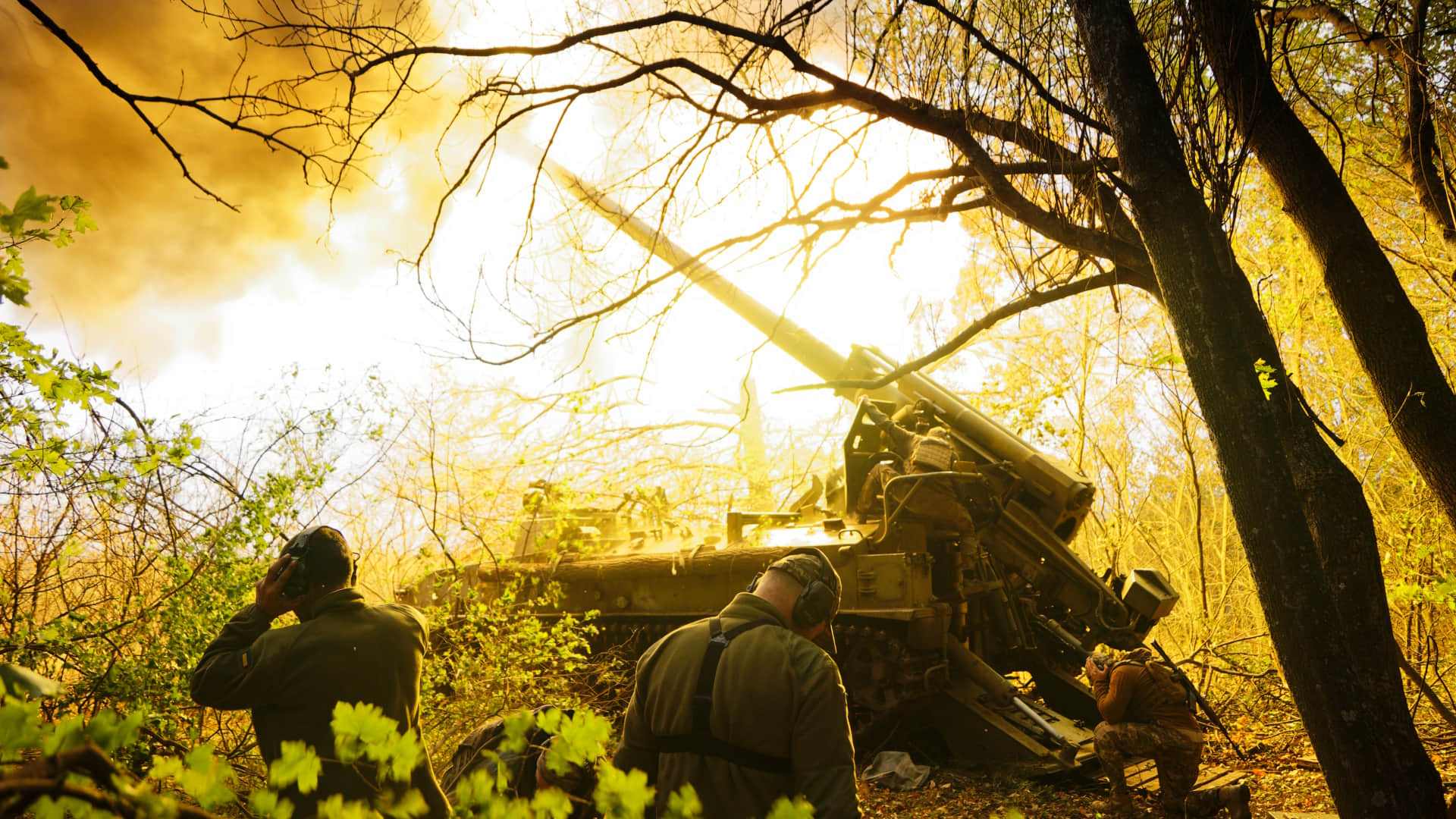 Anton Filatov: In my mind modern weapons are like a cloud of metal. If you're caught in it, like you'd be caught in the rain, you can't survive or stay unscathedPhoto: Dmytro Larin
Anton Filatov: In my mind modern weapons are like a cloud of metal. If you're caught in it, like you'd be caught in the rain, you can't survive or stay unscathedPhoto: Dmytro Larin
I once watched a stunning wash of red spill over Lysychansk while on guard late one evening. I thought it was a magnificent sunset.
But the sky was still ablaze with shades of red half an hour after the sun was supposed to have set, and I realised I was looking east, not west, and what I was seeing was not a scenic sunset, but the hellish glow of phosphorus bombs. Phosphorus bombs unleash clouds that rain bits of matter that burn through everything they settle on. They set everything on fire.
People say hell smells of sulphur, but I'm not sure, I think it must be phosphorus. Plastic, wood, metal - everything dissolves in its foul stench.
Humans
Act instead of overthinking - annoy and irritate - lose themselves in war You don't know how you'll act here until you get here.
It's impossible to foresee. People you don't expect much from do truly great things. Sometimes they don't expect that from themselves either.
They're calm, quiet people who go unnoticed among all those who beat their breast and say they're prepared to march on Moscow barefoot and tear everyone there to shreds. Those who act survive, rather than those who overthink. When you ask someone who they'd made it through something, they say: "I don't remember.
I was just doing something." Actions are reflexive, partly unconscious: you run, reload your gun, throw a grenade, run back, crouch, lie down, jump. It's this animal energy. People fighting in one part of the front might not be aware of the existence of people fighting elsewhere, but they all act as a single organism.
This makes you feel at one with the people around you. Even if their snoring, smell, or way of speaking bother you. But their - or your - actions can really help someone.
I don't want to be pompous, to say you can save someone's life, but you can help someone make it through the day.